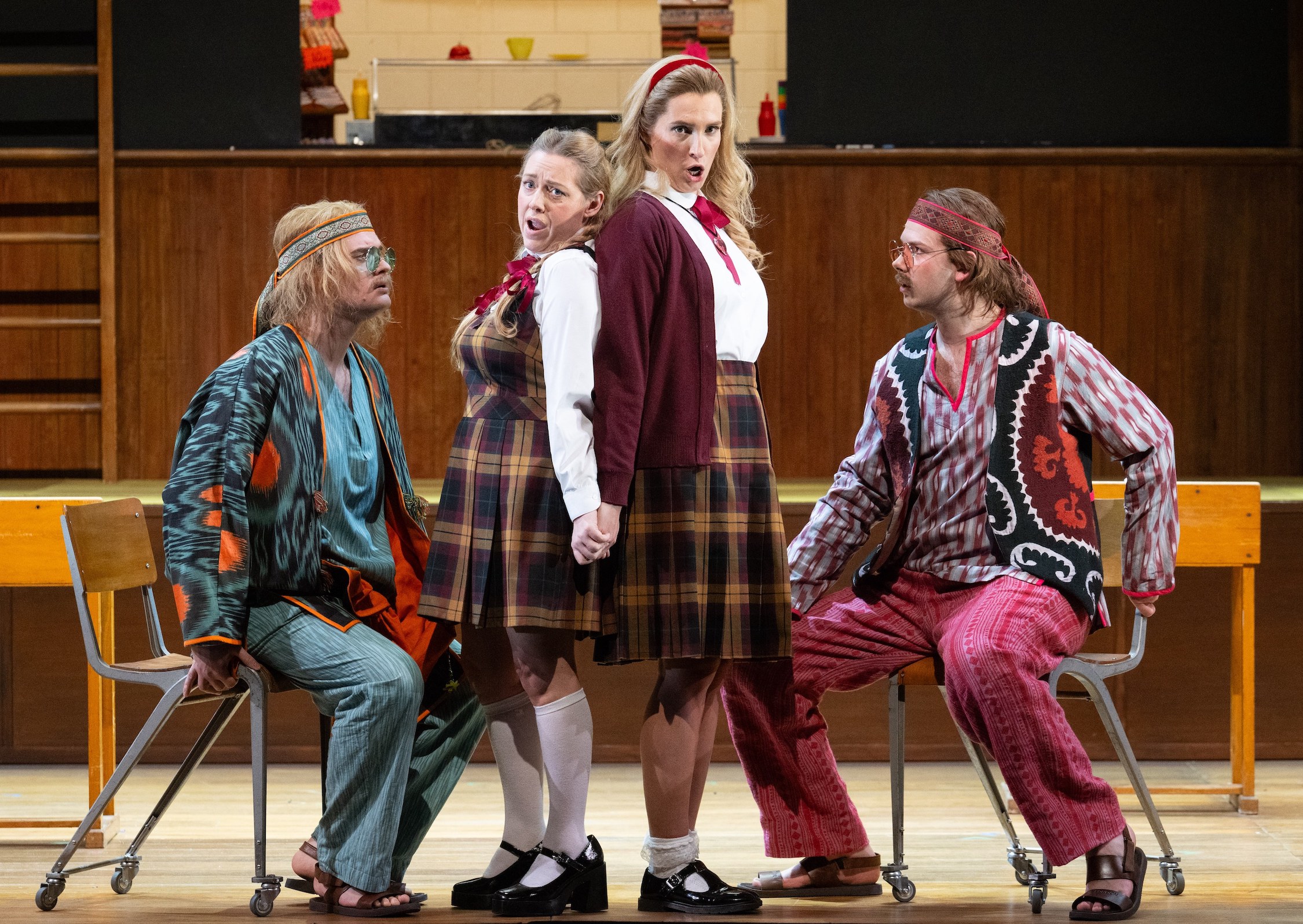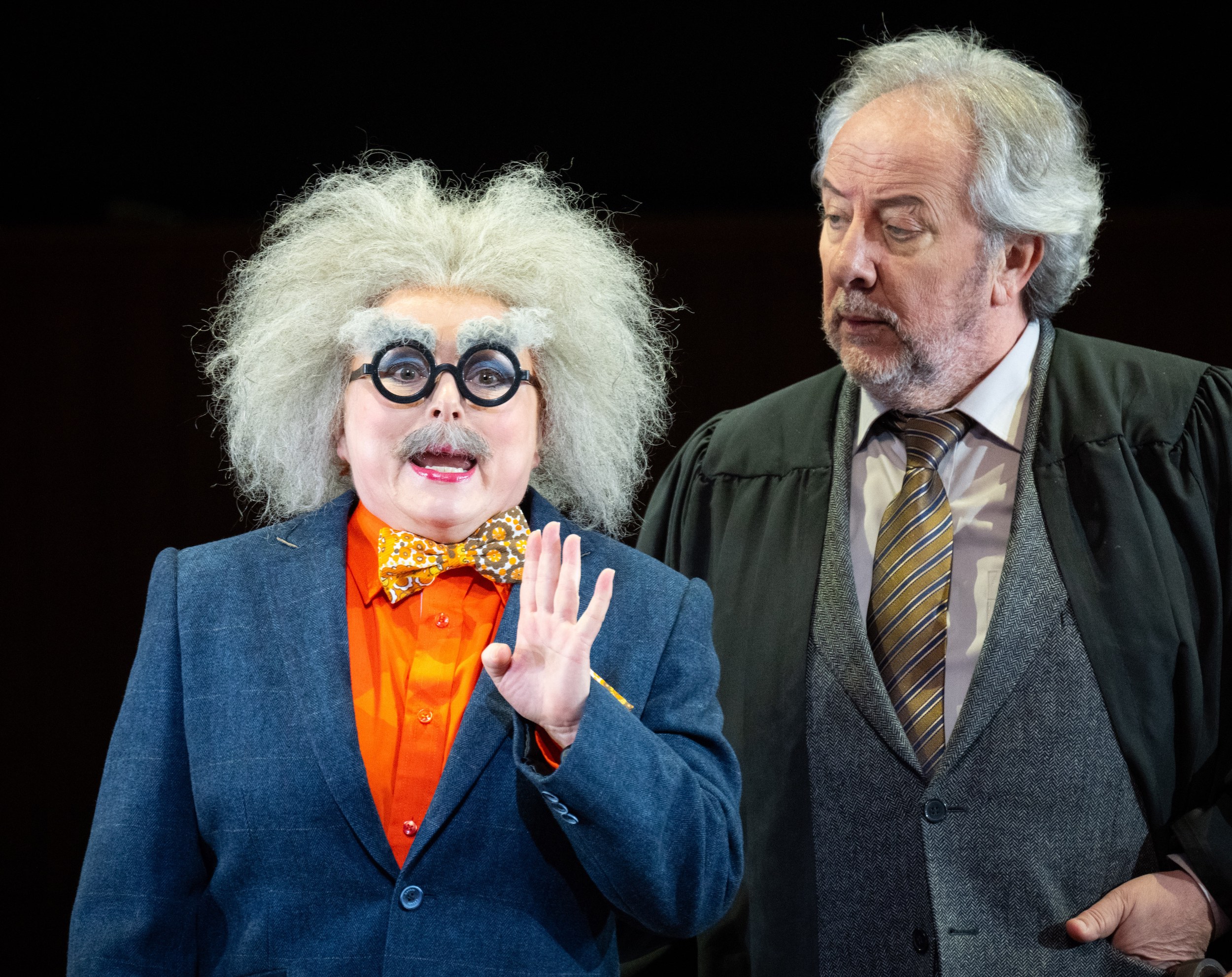We can’t do without Così fan tutte; it’s an irresistible masterpiece. But it’s a thorn in the flesh of modern directors, who struggle to find the "relevance" they seem to need in order to get the wretched piece on to the stage.
In his new production for Welsh National Opera, Max Hoehn latches on to the opera’s subtitle "The School for Lovers", ignoring da Ponte’s irony and setting it in an actual school; but this is yet another of those doomed concepts that should have remained where they probably originated, among the dirty plates and half-empty wine glasses at the end of a boozy dinner party.
The best thing to be said about Hoehn’s reading is that for most of the time it’s in fact simply "irrelevant". As soon as Ferrando and Guglielmo reappear in disguise they cease to be schoolboys even to the very limited extent they managed in shorts and blazers in the first scene. But the idea dies several deaths before that. Don Alfonso as a cynical schoolmaster enticing his charges into amorous experiment and laying bets with them on the outcome is still less plausible than the deliberately artificial original; and as for these two A-level candidates being suddenly called up into the navy and for this to be believed by their lovers: hmmm! (Pictured below, the two couples: Zhuravskii, Bevan, Decker, Atkinson) The trouble with reimagining a stylised period-piece into modern life is that you beg the whole question of what is and is not real. Da Ponte’s artificialities satirise an over-structured society that denied passion and neurosis, conditions of which our own society is all too aware. Its ultimate cynicism lies in an ending that, after a brief release of genuine emotion, calmly acts as if that had never happened and plonks the lovers happily back into the empty relationships in which they began. For us, this is profoundly disturbing in its correct context, meaningless out of it.
The trouble with reimagining a stylised period-piece into modern life is that you beg the whole question of what is and is not real. Da Ponte’s artificialities satirise an over-structured society that denied passion and neurosis, conditions of which our own society is all too aware. Its ultimate cynicism lies in an ending that, after a brief release of genuine emotion, calmly acts as if that had never happened and plonks the lovers happily back into the empty relationships in which they began. For us, this is profoundly disturbing in its correct context, meaningless out of it.
The irony also depends partly on the exquisite environment of late 18th century Naples, its wigs and costumes, the blue sea and the green foliage, the beauty that conceals the horrors that lurk beneath the breeches and bodices. Jemima Robinson’s single drab brown-walled schoolroom, including at one point the now compulsory urinal, doesn’t begin to cut it, and the frequent intrusion of a gawky posse of alleged 16-year-olds, wheeling cardboard cutouts representing, perhaps, the syllabus they are (not) being taught (including, alas, sex education and spare-rib studies), merely intensifies the gloom.
It also, I suspect, makes life harder for the singers, who cannot escape Mozart’s world even if they want to, which is unlikely. This might be one excuse for the unevenness of the opening night performance, including some slow-quick-slow tempi from the conductor, Tomáš Hanus – too slow for the Act 1 quintet and trio and Fiordiligi’s “Per pietà”, startlingly quick for the final sextet, up and down elsewhere. There were also ensemble troubles here and there, though the playing was mostly excellent as ever. Unusually but deservedly the leader, David Adams, took a bow onstage; but why not also the masterly horn-player of “Per pietà”?
 The boys in their shorts and the girls in their tunics and skirts understandably took time to warm up. Maybe Hoehn had told them to sing like 16-year-olds, something quite beyond sopranos of Sophie Bevan’s and Kayleigh Decker’s mature calibre. Decker is in fact, to my mind, slightly miscast as Dorabella, whose music, especially "Smanie implacabili", sometimes needs a darker, mezzo-ish colouring (though Fiordiligi’s unquestionably soprano music often goes lower). Bevan looked and sounded a shade unhappy at first and was generally not quite back to her best after recent serious illness, managing Fiordiligi’s big arias skilfully but without entirely concealing the strain involved.
The boys in their shorts and the girls in their tunics and skirts understandably took time to warm up. Maybe Hoehn had told them to sing like 16-year-olds, something quite beyond sopranos of Sophie Bevan’s and Kayleigh Decker’s mature calibre. Decker is in fact, to my mind, slightly miscast as Dorabella, whose music, especially "Smanie implacabili", sometimes needs a darker, mezzo-ish colouring (though Fiordiligi’s unquestionably soprano music often goes lower). Bevan looked and sounded a shade unhappy at first and was generally not quite back to her best after recent serious illness, managing Fiordiligi’s big arias skilfully but without entirely concealing the strain involved.
The most stylish singing of the evening comes from the Ferrando, Russian-Ukrainian tenor Egor Zhuravskii, whose delicious "Un aura amorosa" optimistically defies the aura suggested by the school kitchen at the back of the set. James Atkinson’s Guglielmo is excellent in patches, notably in the wonderful, seductive "Il core vi dono" with Decker, also good here; he also survives the attentions of a corps of prancing so-called adolescents in "Donne mie la fate a tanti", an aria quite tricky enough without such distractions.
The disappointment is José Fardilha’s Alfonso (pictured above, with Rebecca Evans), rather coarse-toned, but perhaps unsure of his role as a schoolmaster whose self-appointed task is to corrupt the young. Rebecca Evans’s school-cleaner Despina, with her music-hall disguises as mesmeric doctor and cod lawyer, seems to have been bussed in from central casting, but is none the worse for that: a treat to soften the blow of Hoehn’s modernism.















Add comment